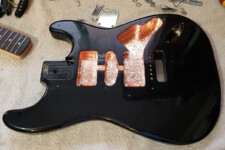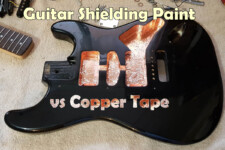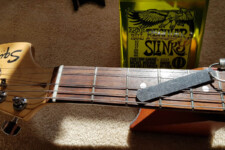Do Humbuckers Need Shielding? Tech Guide
Although humbucking pickups are designed to reduce the hum that single coils are well known for, you can still reduce buzz even further.
Depending on where you play, what equipment you play through, and the importance of quiet background buzz to you and your performances – it can be well worth adding shielding to an electric guitar with humbuckers.
So, if shielding stills adds value to a guitar with humbuckers, what exactly do humbuckers do, and how does shielding work with them to get less ambient noise?
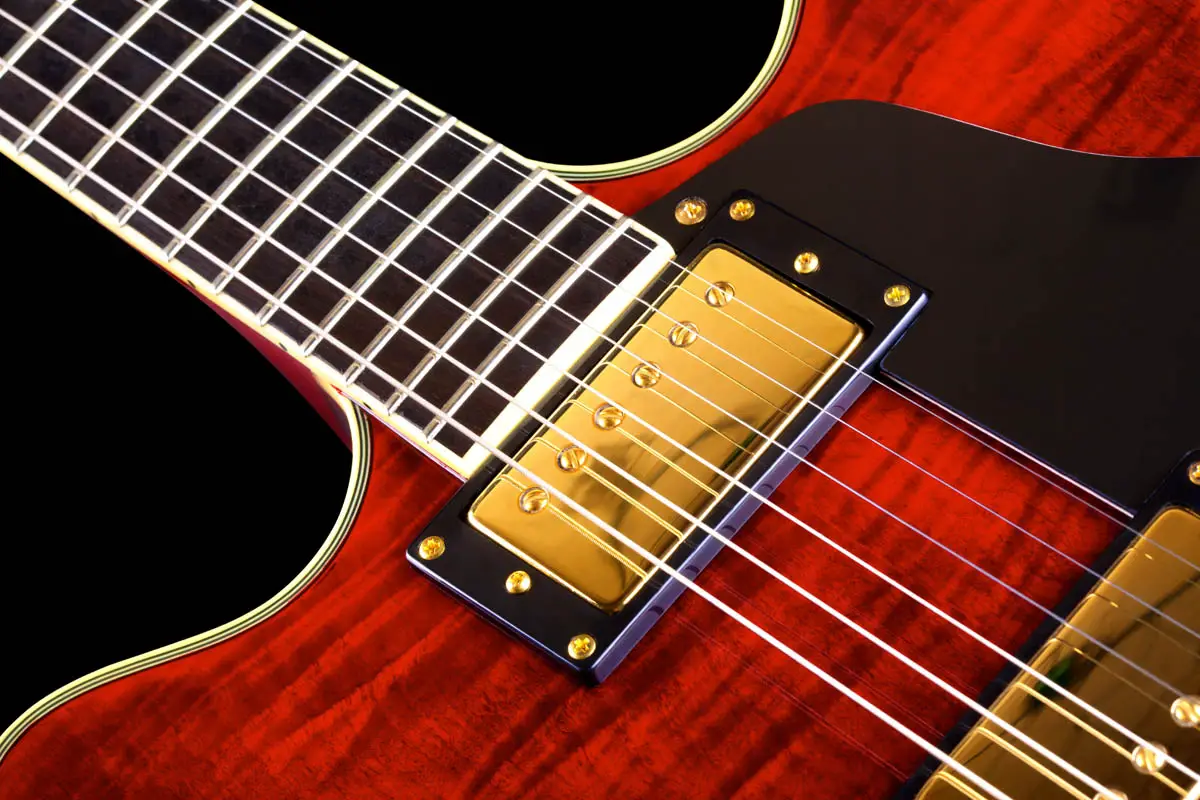
Can Humbuckers Still Buzz Without Shielding?
Technically speaking, humbuckers are designed to “buck the hum”, and not to “buck the buzz”!
What’s the difference?
Hum and Buzz are two different sounds caused by two different issues.
Hum
When you plug your guitar into an amp, and the amp is plugged into a 220V power outlet, you now have a circuit with power cycling at 60Hz.
This 60Hz frequency gets picked up and amplified by the pickups in your electric guitar (or bass), and is heard through the amplifier as hum.
It is this hum that humbuckers are designed to reduce, by having two coils wound opposite to each other, and joined in series (do a Google search for ‘what is a series circuit’).
Buzz
Buzz is different to 60Hz hum, and you can clearly hear it on an unshielded guitar as a crackling sound when you have static electricity near your guitar (such as on a dry cold day). This type of electricity is known as electrostatic.
So not only can you get hum from static electricity, you can also get it from RF (radio frequency) waves; think about the sound you hear at your amp when your cell phone rings. These RF waves are also known as electromagnetic radiation.
Can Humbuckers Still Buzz?
Now that you know the difference, you can understand that Humbuckers are designed to remove hum, but they are not designed to reduce buzz.
So, yes guitars with humbuckers can still have buzz through your amp.
This is where shielding a guitar with humbuckers is still worthwhile, and will give you less background noise, especially if playing on a live stage.
Should You Shield Humbucker Pickup Covers?
As I mentioned earlier, the wrong shielded covers can kill tone, but there are ways around this problem that allow you to shield the pickup covers and still get great tone.
Shielding your covers can depend on how noisy your guitar is already, and whether you prefer the sound without the shielding.
It’s really up to you to decide what you like best, and you might need to experiment before you come to a final decision.
Does Shielding Humbuckers Affect Their Tone?
The biggest reason against shielding humbuckers is because it will affect the tone in some way, no matter how small.
If your guitar is getting terrible buzzing then it may be worth the change of tone to cut the buzz, but chances are your guitar will sound a little different.
There are different ways you can shield your humbuckers though, and some ways affect tone changes less than others.
How Do You Shield Humbuckers?
There are a few different ways you can shield humbuckers, but if you do it the wrong way you can end up with a muddy dark sounding guitar.
You can have a metal pickup cover connected to ground via a wire, and this will reduce buzz, but with the wrong type of cover it can kill your tone.
You can also use shielding tape or conductive paint inside the pickup cover, or even wrap the pickup completely in shielding with a bus wire running along the magnet poles and back to ground.
Which Shielding Metal is Best?
There’s plenty of debate over which metal shields best between copper and aluminum. However it’s well proven that aluminum is far more effective for shielding against RF (which is the only reason to shield a humbucker).
Manufacturers of pickup covers make them in different metal composites and different thicknesses, designed to keep a good sound while shielding effectively.
Some common metals these pickup covers are made from are:
- Gold-plated or chrome-plated nickel-silver.
- Gold-plated or chrome-plated brass.
- Copperless plated.
The H-Slot Pickup Cover
Gretsch designed humbucker pickup covers that give great shielding, but still allow a bright lively tone. They did this by having two slots for the magnet poles, with a slot in the center joining them.
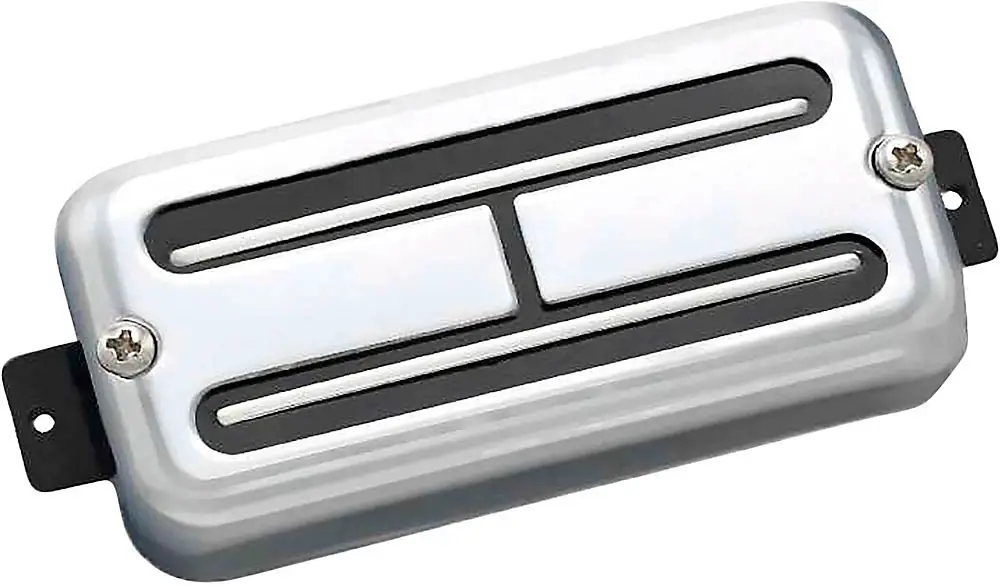
This ‘H’ slot pattern effectively breaks the eddy currents that kill treble with full metal covers.
If you have plastic covers, you can recreate this pattern on the inside of the cover with some HVAC aluminum tape, and connect a wire from there back to your guitar’s ground.
This is a great way to go if you want to keep the original look of your guitar while gaining the benefit of shielding, and maintaining as much original tone as possible.
Should You Shield Humbucker Body Cavities?
Even if you decide not to shield your humbuckers, it is still well worth shielding the guitar cavities where your electronics are housed.
Once again, this all comes down to personal preference, and if you feel your guitar is too noisy then the best way to quieten it is with shielding.
Most of the RF and static buzz you hear can effectively be cut by shielding the electronics cavities, and if you still have a little buzz left, you can certainly try shielding the humbucker pickup cavities also.
Most people prefer conductive paint or copper tape for this job. Copper tape can be a great choice since it is easy to remove again if you decide you don’t want it, and you can also solder easily to it for grounding.
Hum and Buzz – Humbucker!
You should now have a clearer idea about why you would choose to shield humbuckers, and understand some ways to do that.
Humbuckers buck the hum, and shielding bucks the buzz.
If you have too much background noise in your rig, even with humbucker pickups, then shielding can be a great way to reduce the buzz.
Just keep in mind that any change to the electrical environment in your guitar will change the tone to some degree.

